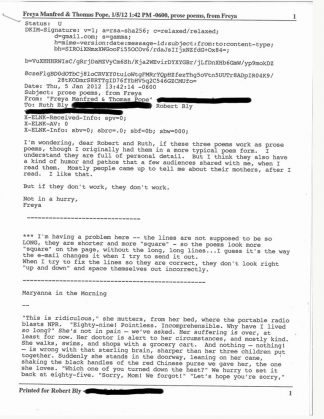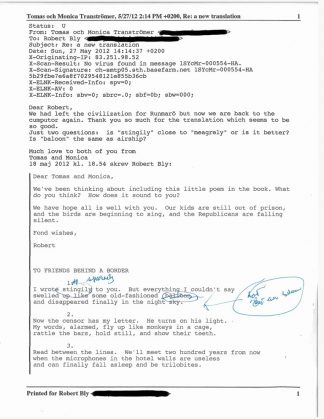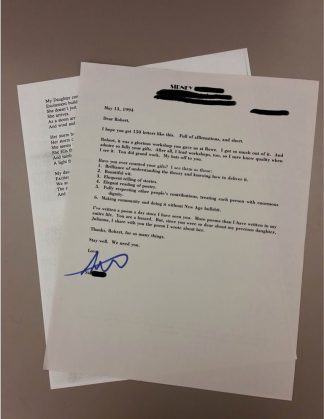By Jennifer Shaw-Spence
Project Archivist, Upper Midwest Literary Archives
From the archivist for the ‘Prairie Poets and Press’ project
Robert Bly is best known for his poetry and his book Iron John, which is credited with starting the Men’s Movement. The consummate writer, it follows that Bly would also be a voracious writer of letters.
Letters written to and from Robert Bly speak volumes about Bly’s impact — not only as a writer but as a figure in the landscape of local and national literature. Though his poetry and essays are examples of how he presented himself to the public, his correspondence offers a more private perspective.
Bly’s collection of correspondence reads as a who’s who of famous authors — from Pulitzer-prize winning poets, such as Ted Kooser, to hometown heroes like Freya Manfred and Bill Holm. Often these letters include not only the daily details of the authors’ lives, but also poems and prose they were working on.
Bly would read over the poems or essays and offer critiques or share a joke, while also inquiring about family members. He would then reply with his own poems and requests for their critiques as well. These frequent exchanges show how the poems of many a writer, including Bly, were tweaked before their final publication, if they were published at all.
Airmail: The Letters of Robert Bly and Tomas Tranströmer
These letters could fill volumes, and indeed, the frequent correspondence between Robert Bly and Swedish poet Tomas Tranströmer fills one book. Bly’s friend, assistant, and fellow writer, Thomas R. Smith, collected and included the letters of Bly and Tranströmer into a book titled Airmail: The Letters of Robert Bly and Tomas Tranströmer, published by Graywolf Press in 2013.
The published work includes their correspondence from 1964 to 1990. They continued to exchange letters even after Tranströmer suffered a stroke in 1990, which left him without movement in his right arm. These letters largely addressed translation queries, suggestions about poetry, and personal messages about travel and their families.
Even during the process of publishing Airmail, the two poets and their spouses continued to exchange letters about the book:
“We’ve been thinking about including this little poem in the book, what do you think?” Bly wrote to Tranströmer and his wife in 2012.
While the original correspondence can be found in Bly’s papers, publishing materials for Airmail are found in both Bly’s archives as well as the archives of Graywolf Press, also held at the Upper Midwest Literary Archives (UMLA).
A series of cross-collection connections
In fact, there are many cross-collection connections within the UMLA. It’s common in archival collections to have only one-half of the conversation in correspondence, but Robert Bly kept records of his responses to many of the letters he received.
Bly was such a prolific correspondent that his letters show up in several of the collections of other writers represented in the Upper Midwest Literary Archives, including: James Wright, John Berryman, Louis Jenkins, and Bill Holm.
Along with famous authors, Bly corresponded with aspiring writers, lovers of poetry, and followers of the Men’s Movement. These letters are often deeply personal and filled with requests for advice, appreciation for his contributions, and sharing of their own stories. Bly responded to many, offering insight, condolences, and suggestions. A young woman once wrote to Bly asking for a note as a gift to her father, who was a fan, for his birthday. Her letter mentions a pre-stamped and addressed envelope for the note — the envelope was not found among the papers, leading us to believe that Bly acquiesced to her request.
Contributors or attendees of the many conferences for men Bly founded or spoke at would write asking for clarification on Bly’s opinions on manhood and spiritualism. He responded with brief descriptions of his personal beliefs on masculinity.
Aspiring poets would offer praise of Bly’s works and send their own published pieces, others would send first drafts and then shyly ask for assistance with their own poems. In 1994, one workshop attendee wrote to Bly about his new-found love of writing. “I have written a poem a day since I have seen you. More poems than I have written in my entire life. You are a hazard. But since you were so dear about my precious daughter Julianna, I share with you the poem I wrote about her.”
Letters poured in from around the world
Such letters would pour in from around the country and internationally; domestic letters would come from states as far away as Texas and New York, but international letters from India, New Zealand, Estonia, and Iran found their way to Bly’s mailbox as well. Bly regularly responded to his fans, offering the desired criticism, sharing their hopes, and condoling with them in their grief.
The overall impression the reader gets from the last several decades of Robert Bly’s correspondence is, that as an editor, hero, or friend, Robert Bly encouraged confidence.
Funding for Prairie Poets and Press
Prairie Poets and Press has been financed in part with funds provided by the State of Minnesota from the Arts and Cultural Heritage Fund through the Minnesota Historical Society. The Minnesota Historical and Cultural Grants Program has been made possible by the Arts and Cultural Heritage Fund through the vote of Minnesotans on November 4, 2008. The Arts and Cultural Heritage Fund raises millions of dollars each year to support the artists and cultural heritage institutions (such as historical societies, libraries, and museums) that keep our state great, our citizens thoughtful, and our community thriving.
—Jennifer Shaw-Spence is a project archivist for the Upper Midwest Literary Archives. Learn more about the Upper Midwest Literary Archives.
The materials featured in this article are from the Robert Bly papers in the Upper Midwest Literary Archives at the University of Minnesota.







